New AI agent aims to ease process of tracking employees’ work performance
Sign up now: Get ST's newsletters delivered to your inbox
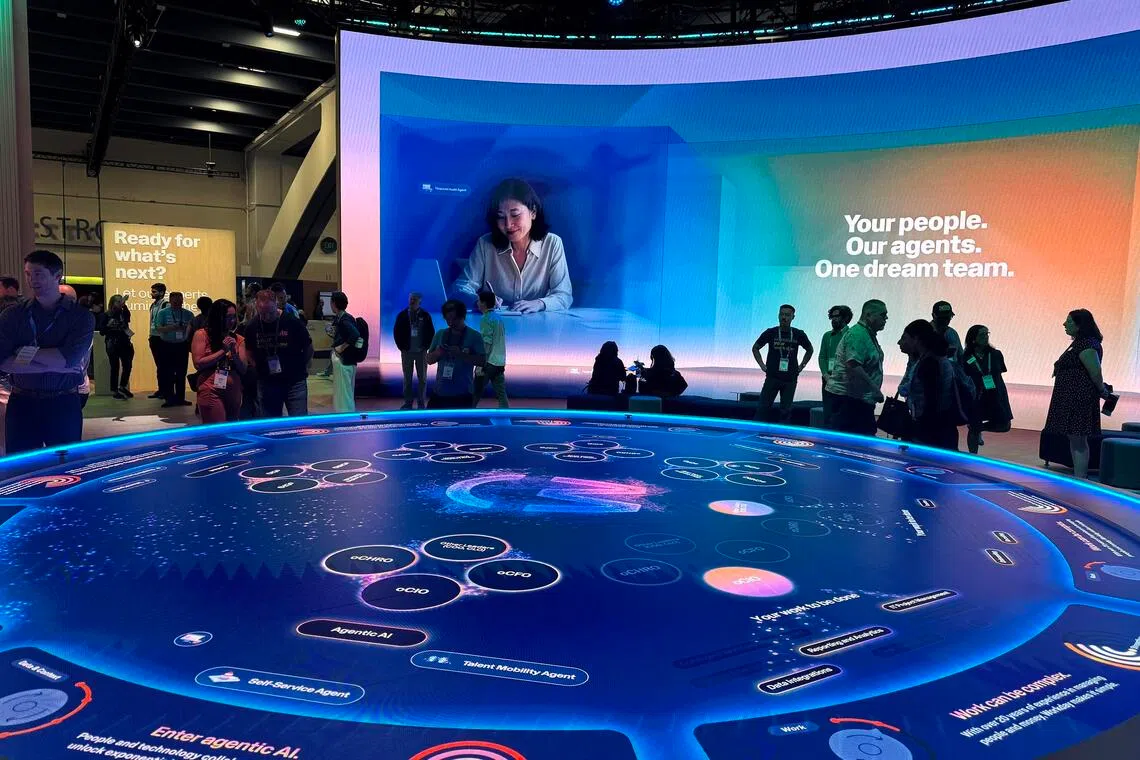
Global enterprises, including those in Singapore, can tap future solutions to help HR teams focus on higher-value work.
ST PHOTO: SHARON SALIM
Follow topic:
SAN FRANCISCO - Global enterprises, including those in Singapore, will be able to tap a new solution that can help them review their employees’ work performance.
Dubbed the “performance agent”, it is one solution human resource and finance platform Workday has come up with to help employers focus on higher-value work.
“It takes so much time, and it’s a lot of work. I think that maybe performance reviews have a bad name because of how much work goes into writing good ones,” said the company’s chief technology officer Peter Bailis, who was speaking at a press panel on Sept 16 at the Workday Rising conference held in San Francisco.
To write a great performance review that makes a fair and constructive assessment, he added, managers often need to dig up an employee’s goals and one-on-one check-in notes.
“It’s to gather that context, so you can have a complete picture across sources of information: What did this employee contribute? How did they stack up against their goals?”
With the future agent’s help, bosses can start the process by providing relevant data points, such as an employee’s resume and inferred skills, and historical performance data.
More time for meaningful work
Ms Jess O’Reilly, the company’s general manager for Asean who is based in Singapore, said one of the biggest challenges for organisations and their HR teams is being bogged down in repetitive work, leaving them with very little time to be strategic.
She said artificial intelligence agents are all about context. “Because you can throw a lot of data at an agent, but if it provides the right context, it’s going to be very powerful.”
Drawing a full year’s worth of data across Workday and other systems like software management tool Salesforce, the future agent can offer managers a comprehensive starting point on an employee’s contributions.
Such future work solutions involving the help of a co-pilot – like that of an AI agent – could potentially revolutionise the way HR teams and professionals work.
“Most HR people are stuck at being an HR help desk, rather than being an HR business partner,” she said.
The “performance agent” is one of the six new HR agents that were announced during Workday’s flagship yearly conference from Sept 15 to 18 in San Francisco. They will go live in 2026. More than 30,000 attendees from over 70 countries were expected to attend the Workday Rising conference.
“Done well, performance reviews shape culture, drive outcomes and rewards. If done poorly, they are rushed, biased and very much coloured by recent memory,” said Mr Bailis.
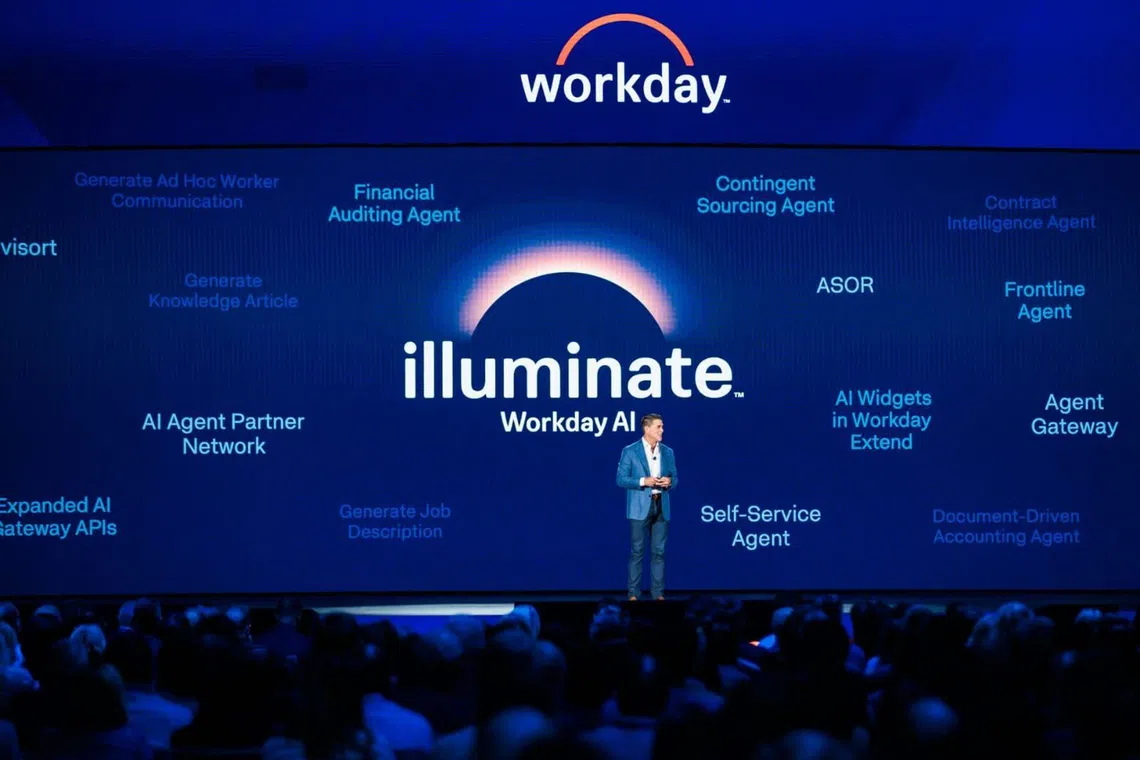
New AI agents designed to help companies and employees work faster and smarter were announced during Workday’s flagship yearly conference.
PHOTO: WORKDAY
Five other future HR agents designed to help bosses work faster and smarter include the “case agent” and “job architecture agent”, as the company calls them.
Ms O’Reilly told The Straits Times that a “case agent” would be able to help handle the high volume of lower-complexity disputes, allowing the HR managers to focus on the more complex ones.
Meanwhile, small and medium-sized enterprises that look at providing employees with a clearer career progression pathway, for instance, can benefit from such AI help.
“More smaller businesses are turning to Workday because at the beginning of their journey, they want to set up the right backbone and the right job architecture so that as they grow, they do not have to change and reinvent the wheel,” she said.
With more than a trillion transactions on the platform every year, Workday has a broad view into how people and money move through organisations.
But the company can also be very micro in terms of how that is applied, said its global chief technology officer Joe Wilson.
“The model works with the big picture, but it becomes very discreet when it’s using the tentative data that’s not shared with other tenants. We respect the privacy and controls our customers want.”
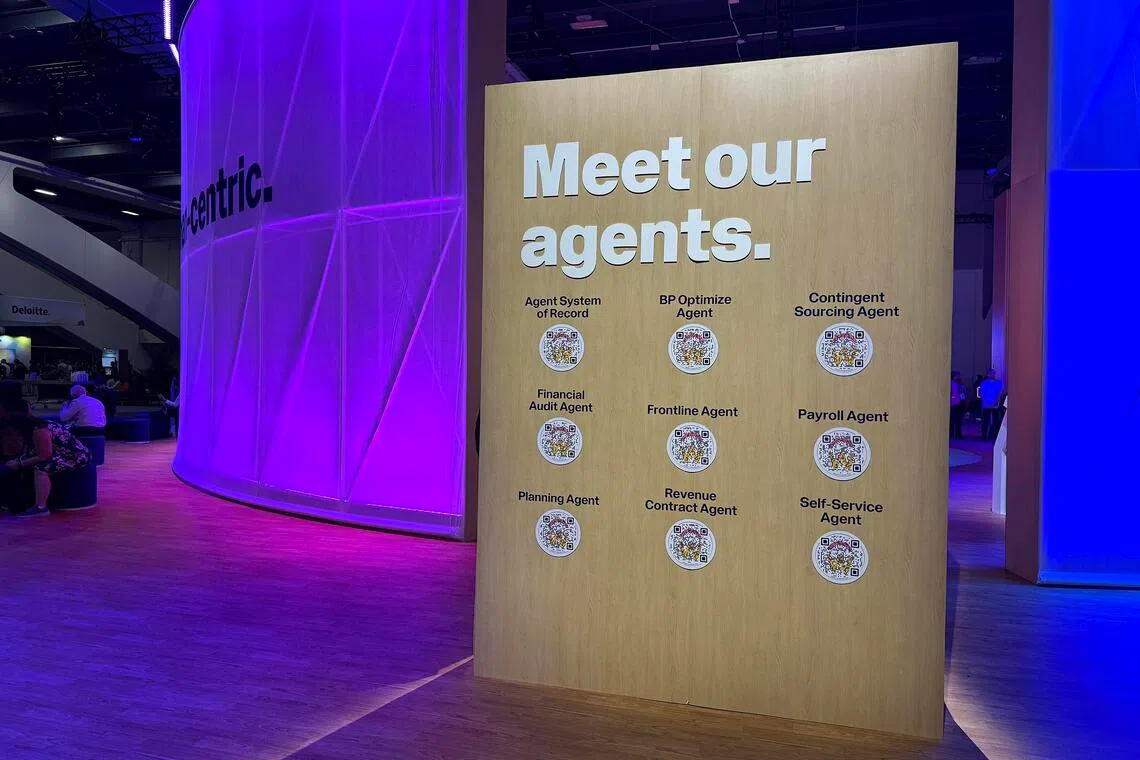
Future work solutions involving the help of AI agents can change the way HR teams and professionals work.
ST PHOTO: SHARON SALIM
Singapore as an investment destination
The platform is used by more than 11,000 organisations globally, including Singapore’s real estate firm PropertyGuru and low-cost carrier Scoot. It marks its 20th anniversary in 2025.
The company’s Singapore office at Guoco Tower has nearly 200 staff, with functions including sales, product, legal and procurement. It is also the headquarters for the South-east Asia market, and expanded its office space in 2024.
Its Singapore base is also home to some of the company’s largest customers – and one of the fastest-growing regions – in the Asia-Pacific. Speaking to the media at the event, Workday’s chief executive Carl Eschenbach affirmed Singapore as an investment destination.
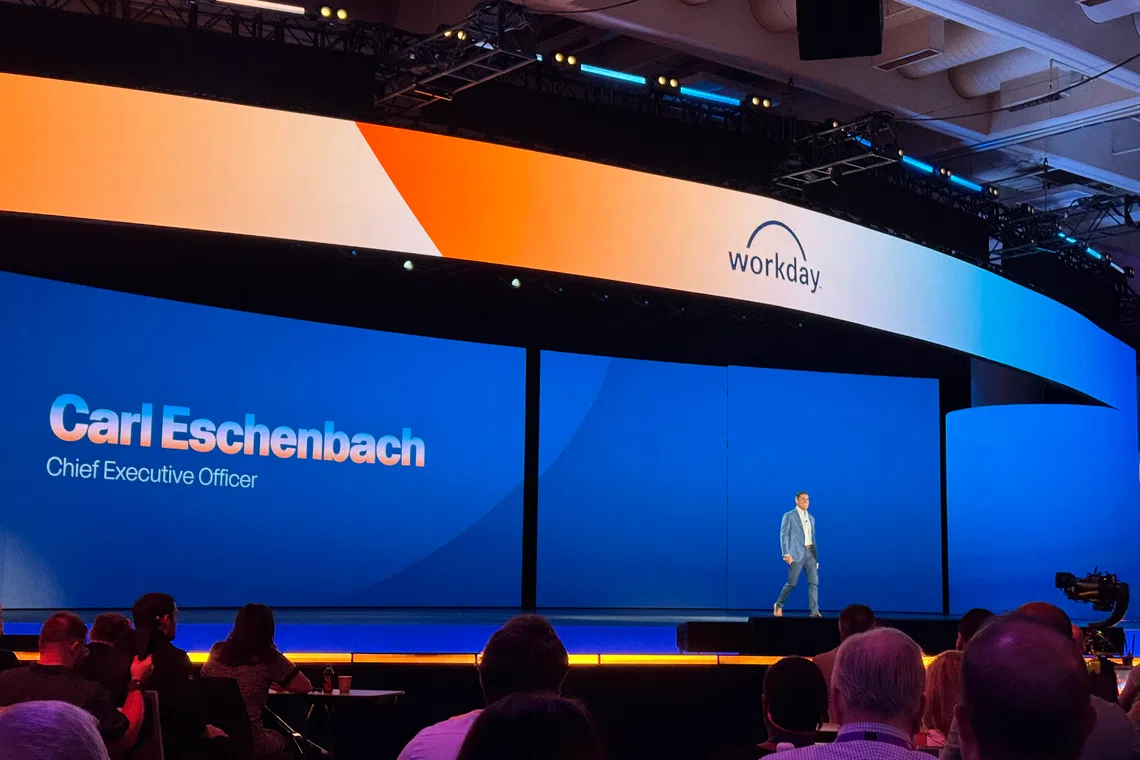
Workday’s chief executive Carl Eschenbach speaking at the Workday Rising conference on Sept 16.
ST PHOTO: SHARON SALIM
President of the Asia-Pacific region Simon Tate said the company is actively increasing its staff strength in Singapore, with increased capacity in support functions such as marketing, customer success and customer advocacy.
He said: “There is a natural expansion of our customer base, and with that comes expansion of distribution personnel as well as support staff.”
Ms O’Reilly, who is responsible for driving Workday’s growth in the Asean region, said: “We see Singapore as a great talent pool, but also (as) a great hub for the region.”
The company recently announced aggressive expansion plans in India, while remaining committed to South-east Asian markets that include Thailand and Indonesia.
The “financial close agent” was also introduced to help finance professionals close the books in a more coordinated, less stressful manner by enabling them to flag issues in real time.
The time-sensitive process is often associated with a mad rush of chasing anomalies and reconciling transactions to produce financial statements.
The first wave of AI agents like the “recruiter agent” and “talent mobility agent” were introduced in 2024 to help companies discover and develop talent.
Since then, US automobile company General Motors has reduced candidate screening time by 70 per cent, while non-profit healthcare group AdventHealth has cut agency spending by US$68 million (S$87 million) in 12 months.
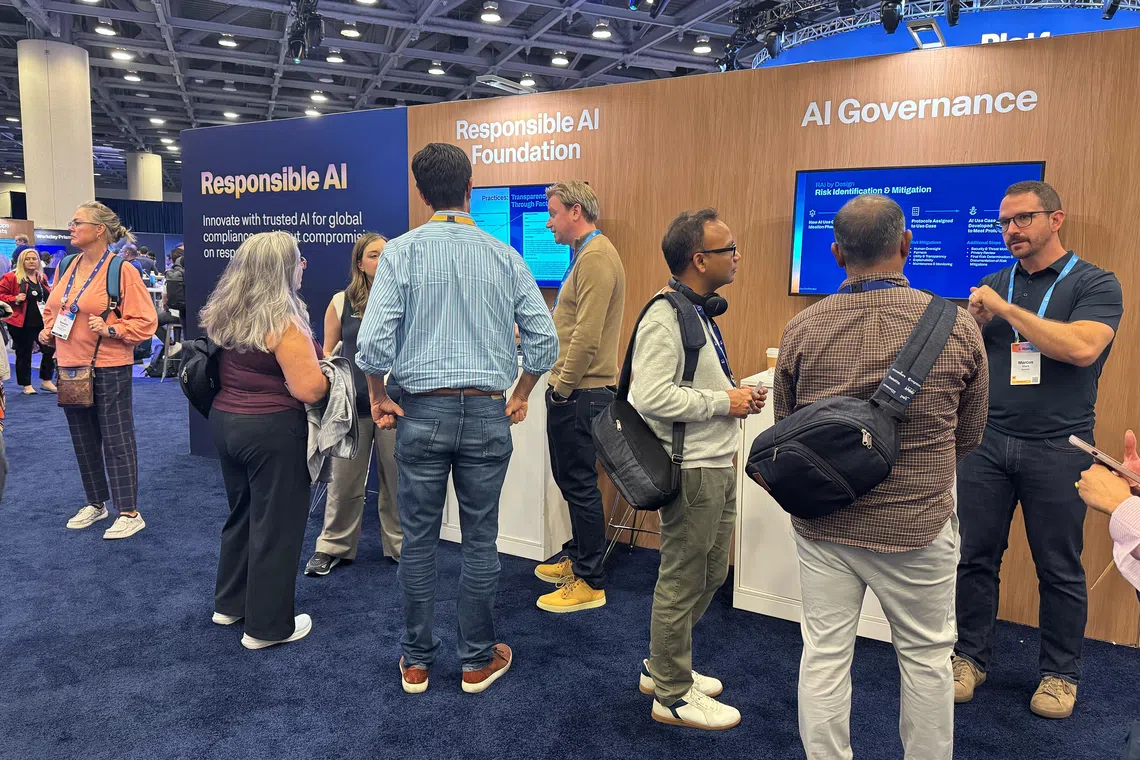
Attendees at the Workday Rising conference held in San Francisco.
ST PHOTO: SHARON SALIM
Workday said its legal team had benefited from its “contract intelligence agent” too, saving 45,000 hours a quarter.
In a keynote speech at the event, Workday co-founder and executive chair Aneel Bhusri spoke about the changing workforce and how difficult it is for employers to manage and bring together a mix of full-time employees, contractors, front-line workers and AI agents.
This includes keeping them focused, engaged and productive.
“We don’t believe in AI being out there to replace humans. We want AI to augment human beings. What you need is a human-centric approach to bring people and AI to work together.”
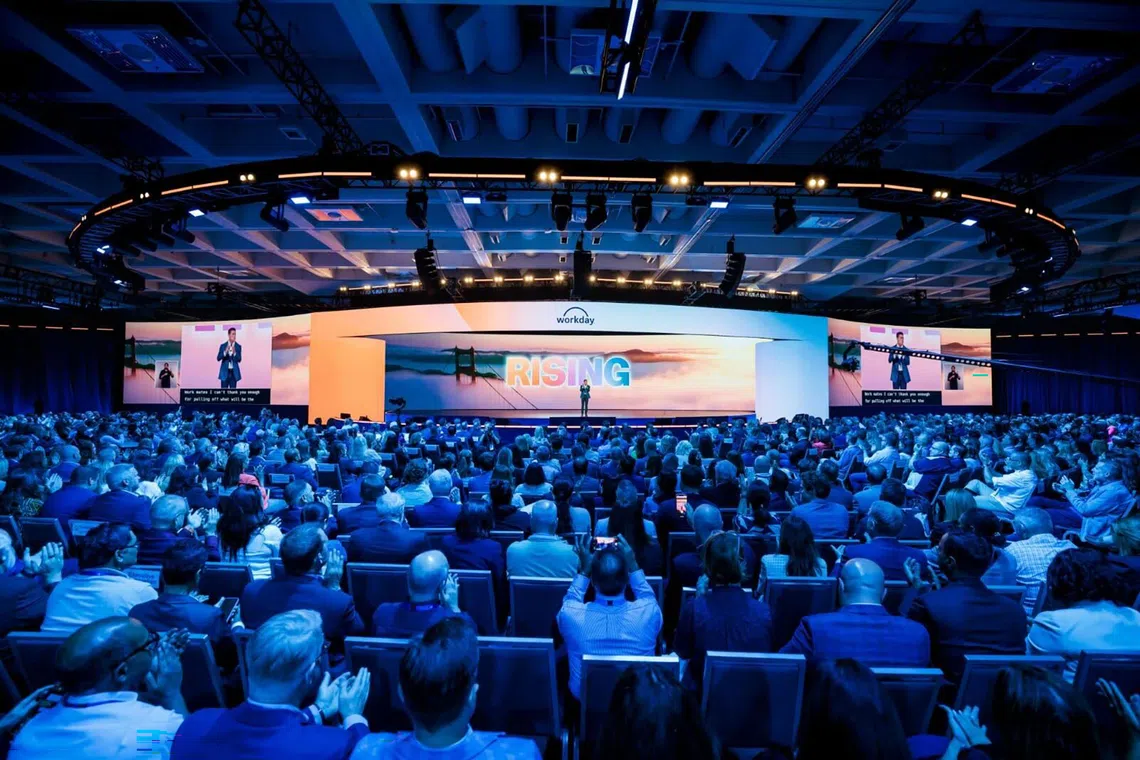
More than 30,000 attendees from over 70 countries are expected to attend the Workday Rising conference.
PHOTO: WORKDAY
Developing your own AI agent
Companies can also try their hand at developing and deploying their own AI agent with the help of a new tool called the Workday Flowise Agent Builder, which will also be made available in 2026.
It has a drag and drop experience that makes it intuitive for use by managers and employees, and not just developers.
For example, bosses can create their own “employee recognition agent” that rewards employees when they hit certain goals. Thus, when an employee completes a key goal, the agent can surface an approval request for managers to approve a $1,000 recognition bonus.
“The real magic comes when agents work together,” said Mr Mark Woollen, global vice-president of partner innovation at Workday. He was demonstrating how the personalised agent can be connected to a “performance agent” so that recognition events can automatically flow into performance reviews.
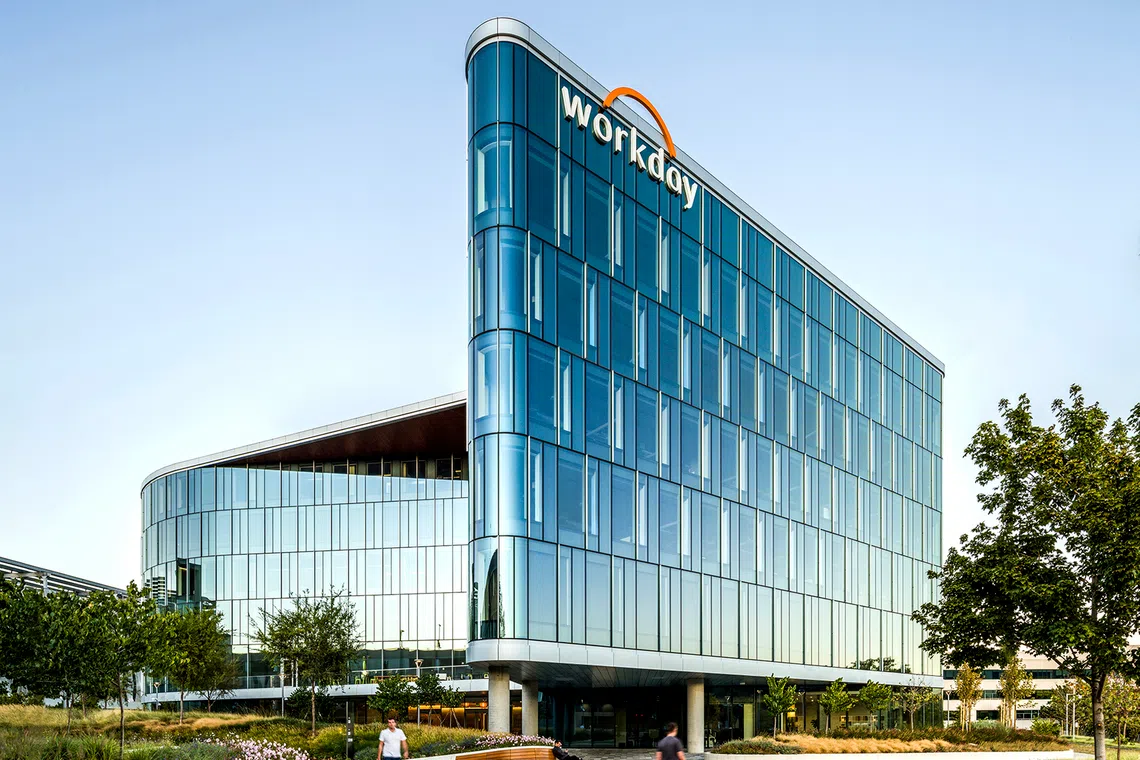
The Workday headquarters in Pleasanton, California. About 200 staff are based in its Singapore office.
PHOTO: WORKDAY
To illustrate his point, Mr Woollen likened the new do-it-yourself app to a stage performance. He said: “It’s the lights, the mic, the scenery. It’s everything that you need as an actor or, in this case, as a developer.
“You have all the support you need so you can excel at your craft, amplify your creativity and empower you to build really amazing apps.”
He also highlighted the challenge of running enterprise data, which is often scattered, hard to find, inconsistent and messy. Companies can eliminate the need for costly data exports and bulky reports with a new data service called Workday Data Cloud.
This tool connects to existing analytics platforms and operational systems, enabling direct and zero-copy access to the companies’ Workday data.
The cloud keeps it secure where it lives, with no more complex integrations and no copying of data, he added.
As organisations continue to grapple with the challenge where AI is everywhere, said Mr Bailis, “meaningful AI use is harder to come by”.
In reality, taking AI from an experimental or demo stage to an enterprise-grade solution that makes real work done is “just super hard”, he noted.
It is also very challenging for companies to navigate the complexity of building and deploying AI on their own. “(But) we’re shifting from the system of record for people and money to a system of action for people and money that understands businesses and what they need, and helps them reimagine what work gets done.”

